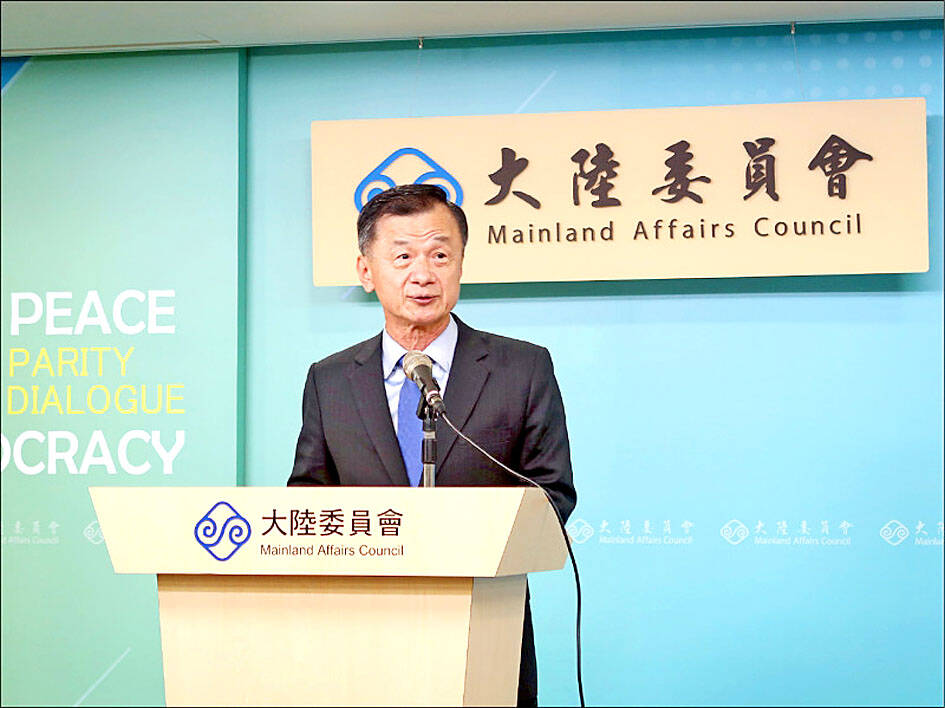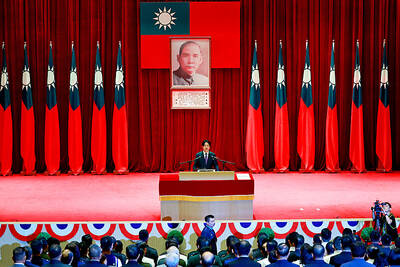Beijing is expected to continue using political and military threats, as well as people in Taiwan who support unification, to push Taiwan into becoming part of China, the Mainland Affairs Council (MAC) said in a report published yesterday.
The report, which the council publishes periodically, analyzes five aspects of the situation in China: its internal affairs, foreign relations and military moves in the Asia-Pacific region, as well as changes in Hong Kong and Macau, and cross-strait relations.
Beijing has intensified its work to “accelerate unification” with Taiwan, the report said.

Photo: Taipei Times files
Chinese Communist Party (CCP) Politburo Standing Committee member Wang Huning (王滬寧) and Taiwan Affairs Office Director Song Tao (宋濤) this month told visiting Chinese Nationalist Party (KMT) leaders that Taiwan and China can increase exchanges and form partnerships on the basis of the so-called “1992 consensus” and opposition to independence, it said.
The “1992 consensus,” a term former MAC chairman Su Chi (蘇起) in 2006 admitted making up in 2000, refers to a tacit understanding between the KMT and the CCP that both sides of the Strait acknowledge there is “one China,” with each side having its own interpretation of what “China” means.
Song also called for cross-strait exchanges to restart as he met with representatives from religious groups in Taiwan, and agricultural and fishery industries to express his condolences after Buddhist master Hsing Yun (星雲), founder of the Kaohsiung-based Fo Guang Shan, died on Feb. 5, the report said.
In the past two years, Beijing unilaterally suspended imports of agricultural, fishery and food products from Taiwan, but revealed that some Taiwanese products have been allowed in after businesses completed registration, the report said.
Beijing has urged Taipei to resume cross-strait flights, as well as the “small three links” connecting China with Kinmen and Lienchiang counties, it said.
“Chinese President Xi Jinping (習近平) told US President Joe Biden in a G20 meeting in Indonesia in November last year that Taiwan is the core of China’s core interests and a red line that must not be crossed,” it said. “In response to US House of Representative Speaker Kevin McCarthy’s potential visit to Taiwan, the CCP also highlighted that it would prevent external forces from intervening in China’s internal affairs and frustrate the plan of pro-Taiwan independence activists.”
China claimed that combat drills in waters and airspace around Taiwan in August last year were launched in response to provocative actions by Taiwan, it said.
“It is expected that the CCP would intensify use of its two-pronged approach toward Taiwan: In addition to the persistent political and military threats, it would continue to use unification supporters and platforms to promote cross-strait exchanges and facilitate the work of unification,” the report said.
Meanwhile, the Chinese Ministry of National Defense reiterated that this year it would focus on preparing for war, and improving joint and all-domain combat capabilities, the report said.
The Liaoning aircraft carrier conducted drills near Guam for the first time in December last year, it said, adding that the Chinese People’s Liberation Army had monitored a US carrier.

TPP RALLY: The clashes occurred near the Chiang Kai-shek Memorial Hall on Saturday at a rally to mark the anniversary of a raid on former TPP chairman Ko Wen-je People who clashed with police at a Taiwan People’s Party (TPP) rally in Taipei on Saturday would be referred to prosecutors for investigation, said the Ministry of the Interior, which oversees the National Police Agency. Taipei police had collected evidence of obstruction of public officials and coercion by “disorderly” demonstrators, as well as contraventions of the Assembly and Parade Act (集會遊行法), the ministry said in a statement on Sunday. It added that amid the “severe pushing and jostling” by some demonstrators, eight police officers were injured, including one who was sent to hospital after losing consciousness, allegedly due to heat stroke. The Taipei

NO LIVERPOOL TRIP: Taiwan’s Lin Yu-ting, who won a gold medal in the boxing at the Paris Olympics, was embroiled in controversy about her gender at that event Taiwanese boxer Lin Yu-ting (林郁婷) will not attend this year’s World Boxing Championships in Liverpool, England, due to a lack of response regarding her sex tests from the organizer, World Boxing. The national boxing association on Monday said that it had submitted all required tests to World Boxing, but had not received a response as of Monday, the departure day for the championships. It said the decision for Lin to skip the championships was made to protect its athletes, ensuring they would not travel to the UK without a guarantee of participation. Lin, who won a gold medal in the women’s 57kg boxing

The US has revoked Taiwan Semiconductor Manufacturing Co’s (TSMC, 台積電) authorization to freely ship essential gear to its main Chinese chipmaking base, potentially curtailing its production capabilities at that older-generation facility. American officials recently informed TSMC of their decision to end the Taiwanese chipmaker’s so-called validated end user (VEU) status for its Nanjing site. The action mirrors steps the US took to revoke VEU designations for China facilities owned by Samsung Electronics Co and SK Hynix Inc. The waivers are set to expire in about four months. “TSMC has received notification from the US Government that our VEU authorization for TSMC Nanjing

CHINESE INCURSIONS, SORTIES: President William Lai thanked military officers for shouldering the responsibility of defending the survival and development of Taiwan President William Lai (賴清德) yesterday said that aggression would inevitably fail, pointing — on the day before a mass military parade in Beijing — to the lessons from World War II and key victories Taiwan claims against Chinese forces in 1958. Taiwan has over the past five years repeatedly complained about heightened Chinese military activity including war games around the nation as Beijing steps up pressure to enforce territorial claims that Taipei rejects. Chinese President Xi Jinping (習近平), flanked by Russian President Vladimir Putin and North Korean leader Kim Jong-un, are to oversee a military parade in Beijing today to mark the